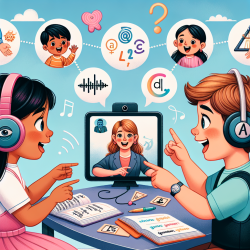The acquisition of grammatical gender is a complex process for bilingual children, especially when learning a second language (L2) with different grammatical structures from their first language (L1). The study titled The acquisition of gender once it has already been mastered: The experience of Spanish-speaking children learning French provides valuable insights into these challenges. Here, we explore how practitioners can implement these findings to improve outcomes for bilingual children receiving online therapy.
Key Findings from the Study:
- Grammatical Gender Challenges: Spanish-speaking children learning French showed significant difficulty in mastering variable feminine adjectives in French. This was attributed to the less transparent gender marking system in French compared to Spanish.
- Syntax and Morphosyntax: The study found that Spanish-speaking children often made syntactic errors, such as incorrect adjective placement, which is influenced by the differences in syntax between Spanish and French.
- Interlanguage Phenomena: The children displayed a dynamic interlanguage system, integrating grammatical structures from both languages but still differing from native speakers of either language.
Implications for Online Therapy:
- Targeted Interventions: Focus on areas where bilingual children struggle the most, such as variable feminine adjectives in French. Incorporate exercises that specifically address these challenges, using visual aids and repetitive practice to reinforce correct usage.
- Contextual Learning: Provide contextual learning opportunities where children can practice language structures in meaningful contexts. This can include storytelling, role-playing, and interactive games that require the use of correct grammatical structures.
- Parental Involvement: Engage parents in the therapy process by providing them with strategies to support their child's language development at home. This can include bilingual storybooks, language games, and encouraging the use of both languages in daily activities.
- Data-Driven Approach: Use data from regular assessments to tailor therapy sessions to the individual needs of each child. Track progress in specific areas of grammatical gender and syntax to ensure that interventions are effective.
Encouraging Further Research:
The study highlights the need for more research on the acquisition of grammatical gender in bilingual children. Practitioners are encouraged to contribute to this field by documenting their observations and outcomes from therapy sessions. Sharing this data with the broader research community can help refine and develop more effective therapeutic approaches.
To read the original research paper, please follow this link: The acquisition of gender once it has already been mastered: The experience of Spanish-speaking children learning French.










